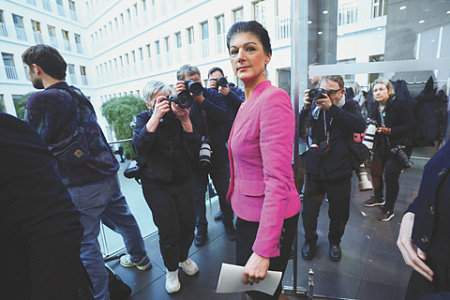
The main political force that lost the election in the German media is called the Social Democratic Party of Germany (SPD). The party, with 300,000 members and supported by trade unions, was able to gain just over 16% of the vote, which is estimated to be the worst result in the entire history of the SPD, dating back more than 100 years.
Of course, you can call the Social Democrats the losing side, but the realities of the political situation in Germany are such that without them, the formation of the country’s government is impossible, and their position on all pressing issues will have to be taken into account by the winner of the election, the conservative bloc of the Christian Democratic and Christian Social Unions (CDU/CSU). Therefore, the co-chairman of the SPD, Lars Klingbeil, immediately after the program speech of the leader of the Christian Democrats, Friedrich Merz, on Berlin radio, noted that Merz should “change both the tone of his speeches and the course he proposed.”
It remains unclear to what extent there will still be politicians in the leadership of the SPD who are able to defend the traditional values of the party, bequeathed by Willy Brandt. The resignation of Rolf Mutzenich, the head of the SPD faction in the Bundestag, who felt personally responsible for the party’s defeat in the elections, can be called desertion in the current circumstances.
The fact that the SPD should contribute to the formation of the future government is evidenced by the blitz polls immediately after the announcement of the results of the vote. According to them, 67% of respondents hope for the creation of a “grand coalition” of the CDU/CSU and the SPD. But it is also noteworthy that 28% of respondents support a coalition of the conservative bloc with the right-wing populists from Alternative for Germany.
However, no more than 36% of respondents expect Merz to be a “good chancellor.” And only 34% feel confident after the elections. The thing is that the fundamental causes of the crisis have not yet been eliminated. They lie, according to the leaders of the SPD, in the fact that Russia decided to “not live by the rules” and began its own war in Ukraine. For Germany, this had disastrous consequences due to the rejection of Russian energy resources for political reasons. German politicians do not want to delve into the essence of the problem.
The reasons for the failure of the Free Democratic Party (FDP) and the Sarah Wagenknecht Alliance that arose in the wake of the crisis are in this regard special cases of the consequences of the outbreak of its own.
Voters tend to blame the Free Democrats for the collapse of the government coalition due to the alleged collusion of FDP leader Christian Lindner with Merz and provoking an internal political crisis. After all, it was Lindner who opposed Chancellor Olaf Scholz and the Greens’ bid to increase government debt. But in this case, Lindner, regardless of the presence or absence of collusion with the CDU leader, as finance minister, proceeded from the tenets of a market economy and opposed increased government interference in economic life. All the proposals of the coalition partners went against the principles of the liberals.
In other words, Lindner became a victim of the country’s population’s habit of receiving social benefits and payments from the budget. In fact, Sarah Wagenknecht became the same victim, whose party lost only 0.03% of the votes to enter the Bundestag. This has given rise to rumors about a review of the voting results, but the party leader’s own request to the election commission on this matter has not yet been made public.
The failure of the Sarah Wagenknecht Alliance, which a few months ago enjoyed, according to polls, the support of up to 7-8% of voters, can be explained rather by the immaturity of the German voter, who did not see a direct link between the party’s demand for a reduction in military spending, including assistance to Kiev, and his well-being. Sarah Wagenknecht promised to leave big politics in case of failure in the federal elections, but has not done so yet.
